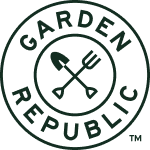Much similar to eating healthy food to grow and maintain a wholesome body, seedlings need healthy soil to grow into robust, well-producing plants! The healthier your soil, the more productive and thriving your garden will be!
Sure, grabbing a shovel and digging a hole in your yard may work in the short-term, but ultimately, you will need to build up your soil! We've put together this little guide to get you on the right track to building stellar soil to be proud of!
Soil VS Dirt
Soil is made up of different types of decomposed minerals, plants, leaves, rocks, lichens, insects, etc.. pretty much any that has broken down into small particles from anywhere in a couple of months, to thousands of years!
Soil is a thriving, living environment, which is kind of ironic since it's made up of dead things right? Just a handful can contain hundreds of millions of living micro-organisms and bacteria including fungi, protozoa, worms, and bugs! Soil holds nutrients well and allows water to pass slowly through it, making it the perfect place to grow healthy plants.
Dirt is more or less "dead" soil. It has very little to no organisms or living structure, causing water and nutrients to pass through it rapidly. This makes it unsustainable for most plants to succeed in.
Adding Life To Your Soil
-Manure: Adding livestock manure from animals such as cows, horses, chickens, and rabbits is an easy way to add lots of nutrients to your soil.
You'll want to take precautions with using manure though. If it's fresh and hasn't had time to break down a bit, it will be high in nitrogen, and can burn your plants! It's best to apply manure in early spring a couple of months before planting, or in the fall after harvesting is done. 
-Compost: Compost typically is not as strong as manure, and can be added throughout the growing season. If you take the time to compost your home food waste, it's a win-win! You get to do something useful for your garden, and keep them out of your trash. There are many ways to go about composting, and at least one of them should work for your garden situation.
You can read about some of the different types of composting, and how to build "hot-compost" here.
Both Compost and manure are great additives to mix in with your soil if they have a lot of clay, or are sandy. They can help make the soil less compact, or help the soil not drain water and lose nutrients so quickly.
-Grow "Mining" Plants: Planting varieties with deep taproots can help build nutrients in your soil. The roots "mine" nutrients deep in the soil, and bring them to the surface, closer to where your veggies and herb roots can reach them. Nettle and Comfrey are two common ones that are used for this. Some people may consider them weeds, but they are valuable in your garden when controlled, and many people use them for home remedies. These often can be chopped down to soil level when they reach maturity, and use as nutritious mulch.
-Edible ground cover: Cover crops are an excellent way to keep your ground from baking, build soil fertility, fix soil structure, help with proper drainage, and add more food to your plate. Varieties such as peas, beans, grains, and clover are good choices. These are also living "mulch" and help keep unwanted plants from taking over your garden.
-Avoid Compaction: Try and avoid walking in your planting space, and creating permanent walking paths in your garden. Compact soil makes the soil less aerated and makes it hard for roots to grow at the proper depth needed. 
-Thoughtful Tilling: Over-using a standard power tiller can actually harm you soil by breaking down the soil-web and organisms. Lightly mixing in your manure, compost, and cover crops with a garden pitch-fork, rake, or shovel into the top few inches of soil once in awhile is a much better solution.
Letting Chickens and Ducks scratch in your (mature) garden is also a gentle way to "till" your garden, and also helps with pest control.
We could write a huge detailed book on all of the above methods. This should get you started in the right direction on building healthy soil for you little sprouts! If you have any questions about this article, or need help growin your seeds, please reach out. You can email us at wecare@shopgardenrepublic.com, or find us on Facebook and Instagram
Happy Soil Building!



